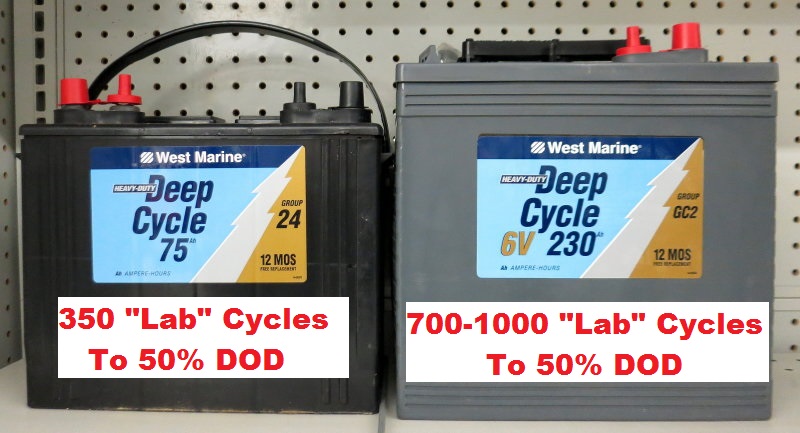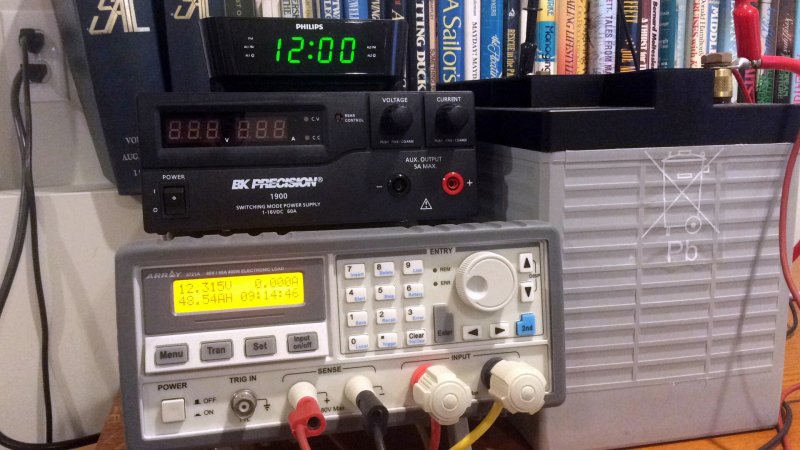My 4D house batteries have "died." Rather than to replace them (an expensive task!) I am trying to find out if there is any truth to the Facebook posts that talk about restoring them. Are there any battery "experts" out there that can answer that question? Are these batteries beyond help? Before you ask - yes - fluid levels are up and they have been on a charger.
BATTERY BASICS
- Thread starter Stargazer3
- Start date
Yes, But...if there is any truth to the Facebook posts
1) Very dangerous if not done right.
2) Most likely will not last long
3) You might do that in time of civil wars.
____
What they are doing is removing Lead Oxide that slowly blocks the plate on a Lead Acid Cell.
So how much Lead is left after the "rinse"?
You can not see the full plate even thru the fill holes.
I would buy new batteries. My 4D's cost ≈$160 each.
Jim...
The problem is lead sulfate forming on the plates which insulates the plates and prevents the chemical reaction that makes electricity. Over time and multiple discharges the plates become so coated the battery is dead.
One remedy is applying a higher voltage to the battery which reverses the sulfating process and restores some capacity back to the battery. However, there is a point of diminishing returns and eventually the battery is dead.
It is also possible to have a battery with very little original capacity, amp hours, where the voltage is near normal. This creates an illusion of a restored battery.
Here are a couple of good articles on batteries. There are others on the site too.


One remedy is applying a higher voltage to the battery which reverses the sulfating process and restores some capacity back to the battery. However, there is a point of diminishing returns and eventually the battery is dead.
It is also possible to have a battery with very little original capacity, amp hours, where the voltage is near normal. This creates an illusion of a restored battery.
Here are a couple of good articles on batteries. There are others on the site too.

What is a Deep Cycle Battery? - Marine How To
Light Cycle vs. Deeper Cycle NOTE: This article deals with FLOODED marine batteries, not AGM or GEL batteries. The Problem: The problem, as I see it, is one of dishonest marketing where multiple battery types wear the same clothes (sticker) and will perform differently when
marinehowto.com

How Fast Can an AGM Battery be Charged? - Marine How To
TEST EQUIPMENT USED IN THIS ARTICLE BUY MHT RECOMMENDED TEST EQUIPMENT - AMAZON Baseline Discharge 49.3% SOC PREFACE: This article looks at the *charging times & achieved state of charge of an AGM battery
marinehowto.com
Are you sure?My 4D house batteries have "died."
Your boat was made in the same Hunter Group and years mine was.
My Freedom 20 Inverter/Charger has a Balancing mode that overcharges the battery for 18 hours in a controlled manner.
Your battery should be Balanced once or twice a year to improve the life.
Mine last 3-4 years.
I take back the old ones and let the Professional recover Lead. They Call it "Core Recovery"
Jim...
PS: It is Lead Oxide, not Sulphate.
Jim,
Battery acid is sulfuric acid, it reacts with the lead plates to make electricity. Lead sulfate forms as a result. Eventually the plates get mostly covered in sulfate and no longer available to make electricity.
Take a look a this photo from MarineHowTo.com, we all know RC wouldn't make stuff up about batteries.
Cheers.

Battery acid is sulfuric acid, it reacts with the lead plates to make electricity. Lead sulfate forms as a result. Eventually the plates get mostly covered in sulfate and no longer available to make electricity.
Take a look a this photo from MarineHowTo.com, we all know RC wouldn't make stuff up about batteries.
Cheers.

NO. There are chargers on the market that say you can re condition the batteries back to new. This is true if all you are measuring is voltage. Voltage does nothing for your batteries. The work is being done by AMPS. Once the lead is done, it is done and time for new batteries
@JamesG161 mentions, some chargers do have an equalization setting that applies a higher voltage to the battery. This can not restore a bad battery, but it can slow down the eventual demise fo the battery as it removes some of the sulfate. But charging and equalization can't make a battery last forever.NO. There are chargers on the market that say you can re condition the batteries back to new. This is true if all you are measuring is voltage. Voltage does nothing for your batteries. The work is being done by AMPS. Once the lead is done, it is done and time for new batteries
Perhaps one of these might help in checking your batteries chemical makeup.

Brand: RHINO TECHNOLOGY
4.9 out of 5 stars 11 Reviews
Rhino Antifreeze Refractometer Ethylene Glycol, Propylene Glycol in Antifreeze Liquids Freezing Point Temperature and Freezing Point Concentration, Automotive Battery Liquid with ATC, Teflon Coating
Rhino Antifreeze Refractometer Ethylene Glycol, Propylene Glycol in Antifreeze Liquids Freezing Point Temperature and Freezing Point Concentration, Automotive Battery Liquid with ATC, Teflon Coating

Brand: RHINO TECHNOLOGY
4.9 out of 5 stars 11 Reviews
Rhino Antifreeze Refractometer Ethylene Glycol, Propylene Glycol in Antifreeze Liquids Freezing Point Temperature and Freezing Point Concentration, Automotive Battery Liquid with ATC, Teflon Coating
Rhino Antifreeze Refractometer Ethylene Glycol, Propylene Glycol in Antifreeze Liquids Freezing Point Temperature and Freezing Point Concentration, Automotive Battery Liquid with ATC, Teflon Coating
Not to start a chemistry debate, But the reaction is reversible, and to make electricity you have to make Lead Oxide,Battery acid is sulfuric acid, it reacts with the lead plates to make electricity. Lead sulfate forms as a result. Eventually the plates get mostly covered in sulfate and no longer available to make electricity.
When your charge them you make Lead Sulphate again.
But the Lead Oxide does not completely reverse back to Sulphate. Thus, slowly blocking the battery plate surface area with Lead Oxide.
I have no problems with seeing Lead Sulphate on the bottom of the battery picture above, but if that was the problem, pour out the old Sulphuric Acid and add fresh Acid,
you have new Battery, right?
Nope!!
You lost plate surface area from Lead Oxidation that cannot be reverse cycled off.
Jim...
I am getting 9 years out of each set of Trojan deep cycle batteries (golf cart format). Never "equalized", but kept on a solid state charger at the slip. Our alternator has been charging at about 14 volts when motoring, maybe a bit more. Good luck on solving the problem. Studying the great material on the Maine Sail site has helped me a lot with understanding this stuff.Mine last 3-4 years.
I have had batteries remaining in the boat in winter storage, completely disconnected, that have still held sufficient charge despite not being on a charger. I have typically had to replace them after 4 seasons.
On the other hand, my neighbor, who is extremely meticulous, removes his and puts them on a trickle charger. On his boat, that is a major Pita both in the fall and in the spring when he has to re install them. His batteries don’t seem to last any longer than mine.
Its going to be interesting this spring with my boat. I was not able to recommission and launch last spring due to a major house remodel, move, and partly because of Covid. I am curious to see if the batteries are any good at all after two winters. Obviously, I have my doubts.
We also have two 2016 vehicles, one a daily driver with an AGM battery that puked last summer, and the other with a lead/acid which is stored and on a charger and that battery is showing signs of being Kaput. My theory is regardless of type or use, four years is about it. My little John Deere lawn tractor in 20 years went through two batteries...go figure.
On the other hand, my neighbor, who is extremely meticulous, removes his and puts them on a trickle charger. On his boat, that is a major Pita both in the fall and in the spring when he has to re install them. His batteries don’t seem to last any longer than mine.
Its going to be interesting this spring with my boat. I was not able to recommission and launch last spring due to a major house remodel, move, and partly because of Covid. I am curious to see if the batteries are any good at all after two winters. Obviously, I have my doubts.
We also have two 2016 vehicles, one a daily driver with an AGM battery that puked last summer, and the other with a lead/acid which is stored and on a charger and that battery is showing signs of being Kaput. My theory is regardless of type or use, four years is about it. My little John Deere lawn tractor in 20 years went through two batteries...go figure.
A battery manufacturer starts with a clean case, new plates and fresh acid and yet a large number of batteries does not live to their expected useful life. The best solution they have come up with through the many years is to sell you a warranty included in the price of the battery. The better the warranty the higher the price. Now take a fouled battery and figure the chances of restoring it to provide a good useful life. Chances are not very good and no warranty. The few that I have seen did not yield adequate reliability. Perhaps it could be considered for a tractor or utility vehicle where a failure might mean a simple inconvenience but for use in a boat where a power failure could put the boat into a precarious situation it is not recommended. Those fouled batteries have plates of uneven and unknown wear, there are contaminants affixed to the plates and the case.
When I was young I knew someone who did restore car batteries. He would melt the tar that held the batteries together in those days, and lift the top off to take the plates apart and wire brush each plate individually put the plates back in reseal it and pour acid in it and it worked like a new battery. That worked until the plates got too thin.
Back when we were younger there was also a chance that the guy did this work without good protective clothing & a respirator, and had his life span shortened up a little -- or a lot.When I was young I knew someone who did restore car batteries. He would melt the tar that held the batteries together in those days, and lift the top off to take the plates apart and wire brush each plate individually put the plates back in reseal it and pour acid in it and it worked like a new battery. That worked until the plates got too thin.
Yikes.
Last edited:
Worked for me along with a few courses in college.Perhaps paying attention in High School Chemistry can pay dividends when you get older and start to play with boats.
That sounds like a poor charging system. I used to get about 4 years from store brand flooded "deep cycle" batteries just charging on the alternator. When I added a smart charger and plugged in while at the dock I get about 7 years out of the same store brand batteries. Apparently keeping batteries properly charged helpsMine last 3-4 years.
I believe we've identified the problem......truth to the Facebook posts...
That aside, how old were the original batteries and do you know how/why they failed? It would be unfortunate to replace the bank only to recreate the same outcome.



